The journey into land surveying
At The Survey School we receive email and phone enquiries from across the globe from those eager to get into surveying. We are always happy to advise on surveying careers. The people who contact us range in age, from school leavers to those who have been working for several decades in a related field and are keen to make a sideways move.
Land surveying is a profession that can be overlooked and often operates “behind the scenes”, yet its impact is felt in every new building, road and public project, and the demand for qualified professionals continues to grow.
Many people start their surveying journey with a passion for the outdoors and a keen interest in maths and geography or technology. Some may have found inspiration from friends or family who already work in the industry – or simply by accident!
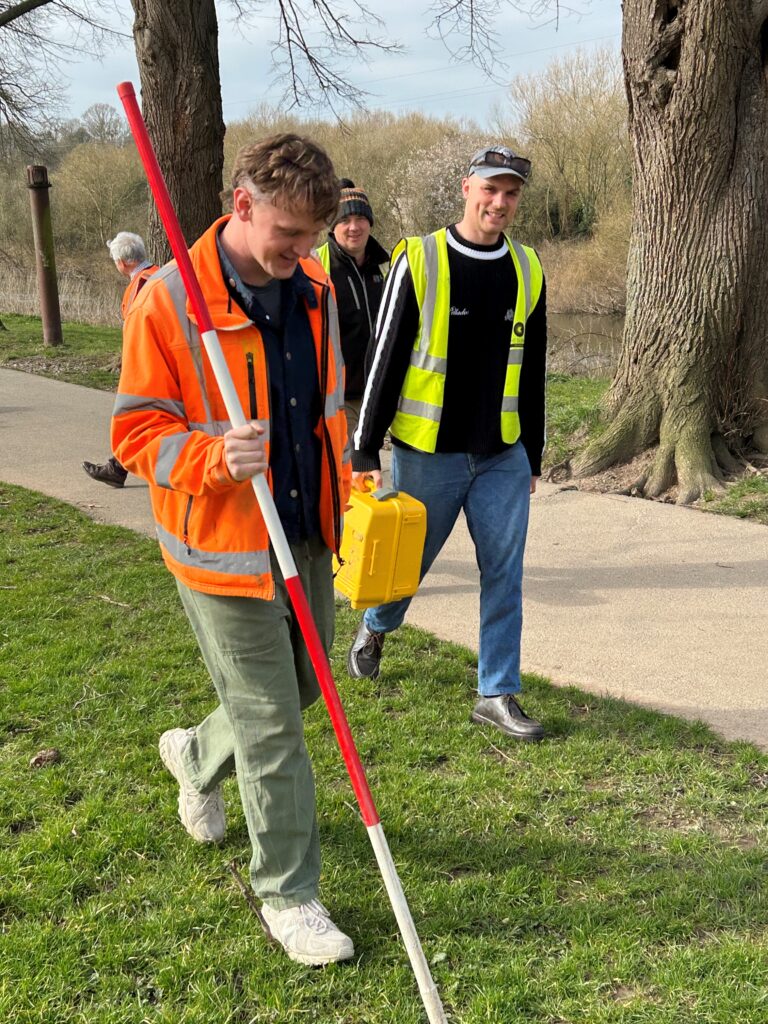
We’ve started to ask our course attendees how they discovered their current jobs in and what led them to surveying as a career. Here are just a few of their responses:
“I enjoy the outdoors and wanted a job that was a mixture of site work and office based”
“I got into it by pure chance. I saw an advert in the local newspaper for a Trainee Land Surveyor. The idea of working outdoors was what appealed to me initially.”
“It was a happy accident. My mum spotted a job advert in the local paper for something called an Assistant Land Surveyor.”
“I just spotted something on LinkedIn.”
Many surveyors can recount memorable moments in the field—the thrill of hiking to a remote location and setting up equipment under a clear blue sky – or in the pouring rain! The variety is the thing that appeals.
“As my tolerance to the wind and rain developed, so did my interest in surveying!”
“It’s fun, it’s complex, it gets my brain going. I enjoy being outside and in new places every day.”
“I needed a challenge as I was working inside a lab prior to this and that was very monotonous.”
While the technical aspects of surveying are significant, so too is the camaraderie developed among professionals. Many surveyors also recount experiences of teamwork, that cement a love for a profession that’s not desk-bound.
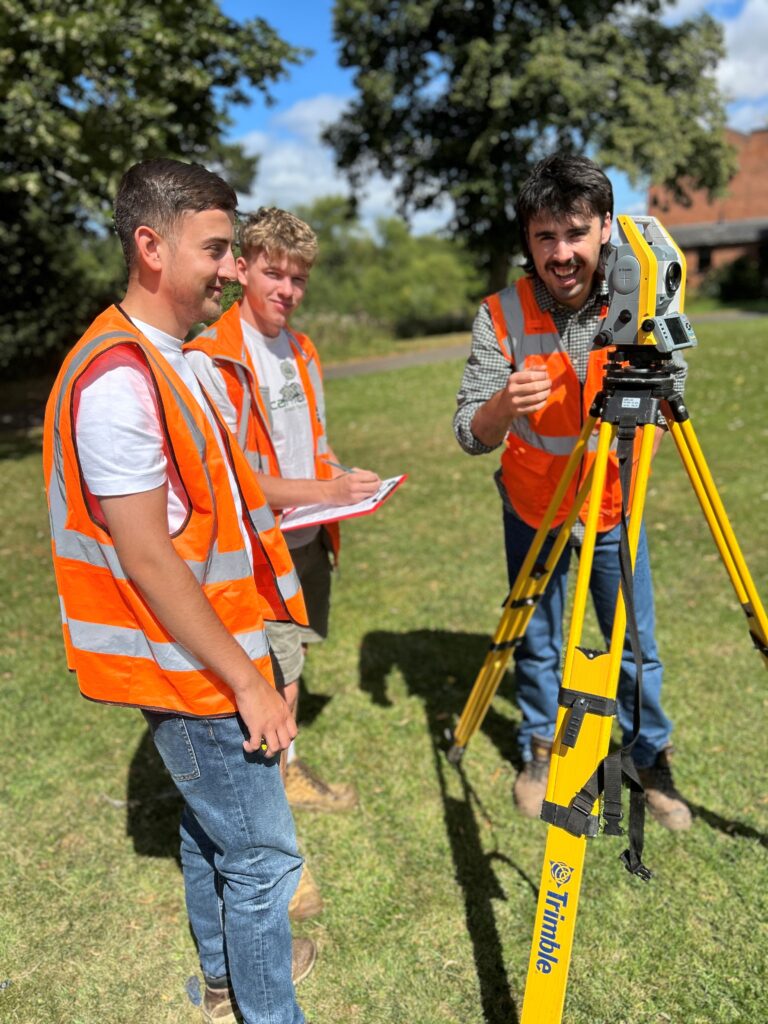
For those that stay with it, there’s also the potential for career progression – moving into managerial positions, specialising in niche areas or setting up your own business.
With the support of The Survey School, aspiring surveyors can find a pathway that suits them, whether starting from scratch or advancing their careers. Our short courses are designed to lay a solid foundation for those new to surveying. We recommend starting with five essential courses—Levelling, Total Stations, 5-Day Surveying, 2-Day GNSS, and 2-Day AutoCAD.
For those who have gained several months of experience, there is the more in-depth TSA Surveying Course, which also leads to a ProQual Level 3 Diploma in Engineering Surveying. Successful graduates not only receive a diploma, but also become eligible for various professional memberships, enhancing their career prospects significantly.
You might take a look at The Survey Association’s jobs page for any trainee surveying jobs in your area. There are also apprentice opportunities available. Apprenticeships are for people of all ages – not just for school or college leavers. There are opportunities for those looking to change careers or progress, such as this one, https://www.findapprenticeship.service.gov.uk/apprenticeship/reference/1000323052
To find out more about our TSA Surveying Course, go to https://www.surveyschool.org.uk/the-course/#book-now
It was an exciting day for The Survey School last week when we had two brand new interactive smart screens installed and officially opened our newly upgraded training room.
We are delighted to share our appreciation for KOREC Group and Trimble Geospatial for their generous sponsorship of a new interactive smart screen and training room and we are grateful to Leica Geosystems for their generous sponsorship of another smart screen.
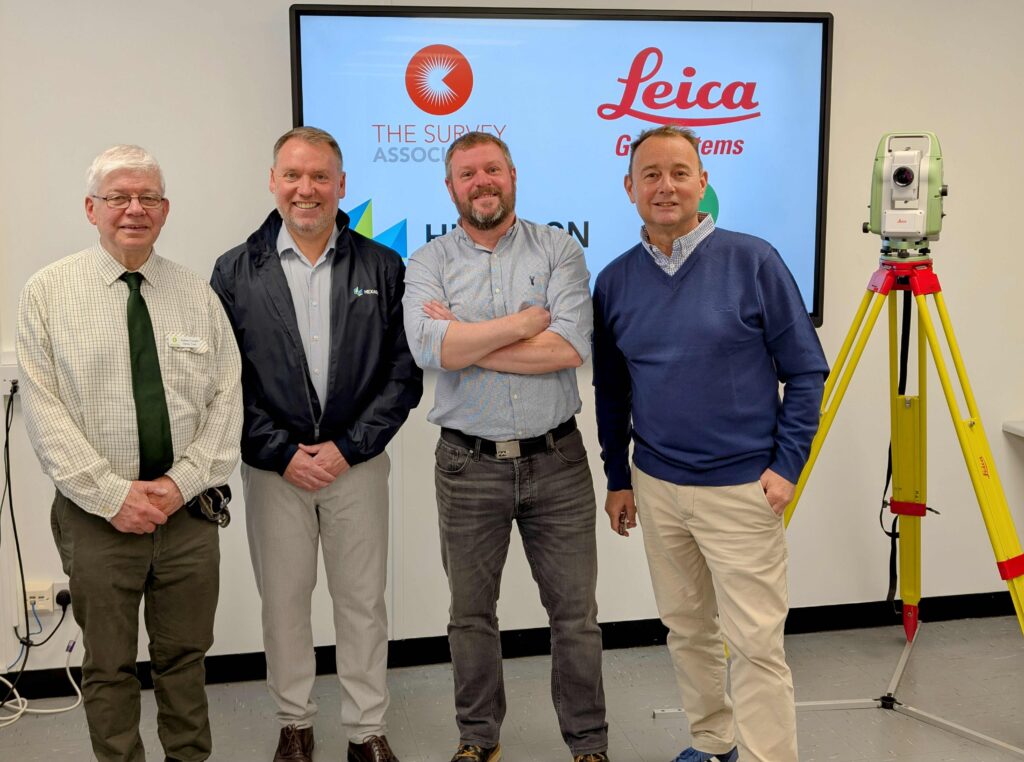
We were pleased to welcome representatives from each organisation to The Survey School for our official installation ceremony so they could see the technology and training room in use by some of our students. This cutting edge technology marks a significant step forward in enhancing our students’ learning experience—bringing lessons to life, boosting interactivity, and supporting our continued drive to improve both our hardware and teaching environment.
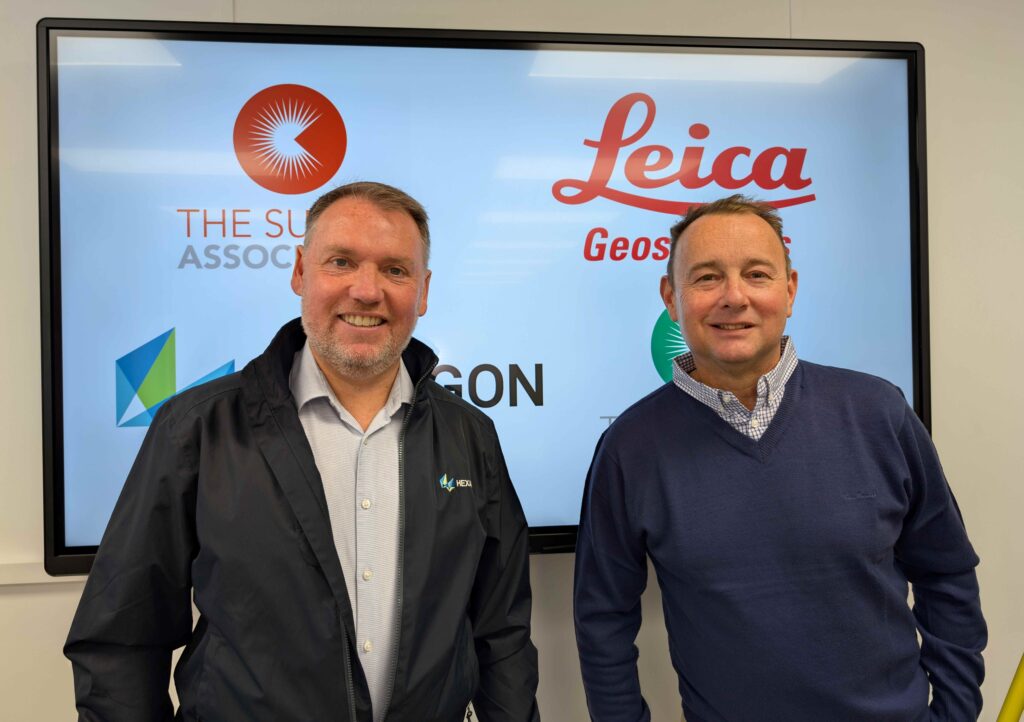
Alan Mansell, Survey School Manager, says,
“These exciting additions enhance the student learning experience, offering a more dynamic and engaging way to deliver course content. It also reflects our ongoing commitment to upgrading the school’s hardware and continually improving our teaching environment. Thank you to all these companies for their support and commitment to the future of surveying education.”
To get the land surveyors we need in the future, we require the best and experienced to train them. We are very lucky to have some fantastic tutors working for The Survey School. Full and part-time, some working as tutors whilst also running their own successful surveying businesses.
We asked our Senior Tutors, Andrew Crumpler and Adam Ball, to tell us about a “typical” day – if there is such a thing – of a Survey School tutor. These tutors shed light on their responsibilities, longer term projects and goals.
How does your day begin?
Andrew: I’m normally at The Survey School around 8am to gather the materials and equipment ready for the students who start at 9am.
Adam: I cycle into work which means the first thing I need after that is a strong black coffee!
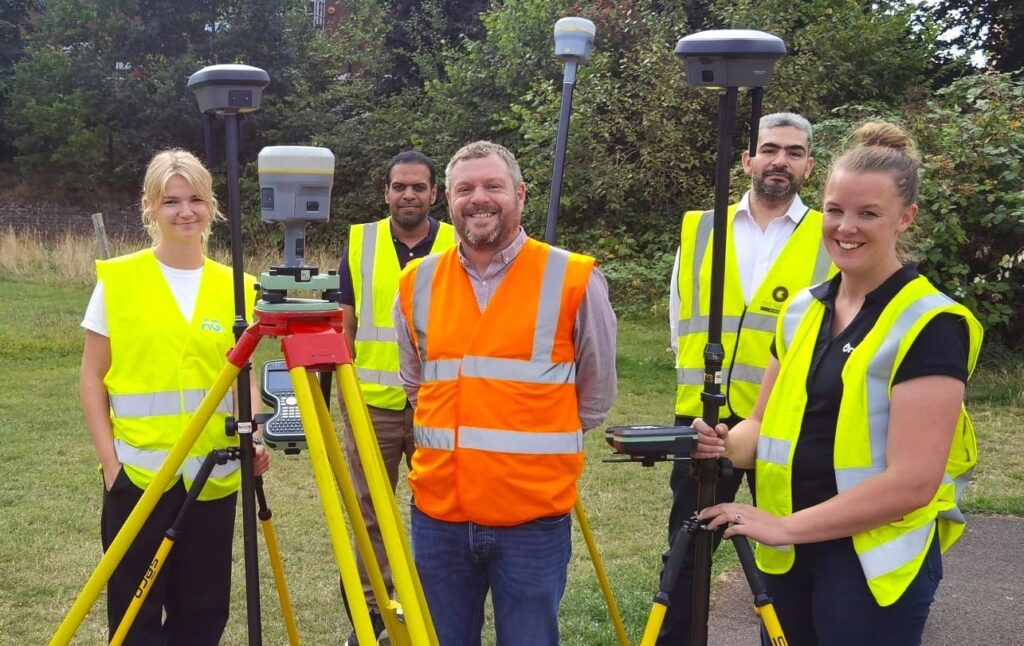
How is your day structured?
Andrew: I spend most of the day teaching – and standing up! Mornings are spent teaching the theory and doing worked examples. The afternoons find us mostly outside on practical exercises.
Adam: When not actively teaching, we’re marking student classwork, exams and assignments and writing reports, planning and preparing lessons and answering emails. Tutors also meet up to discuss plans for course content and share new ideas.
Andrew: Marking student work is a time-consuming process. It’s important to ensure that our marking is consistent and fair across all blocks of our 2-year TSA Course.
What led you to working as a tutor for The Survey School?
Adam: After 15 years working as a land surveyor I spent another 15 working in technical support and training for one of the major equipment manufacturers. I discovered the joy of sharing my experience and the satisfaction of helping to improve companies’ workflows and utilisation. This is what led me to taking the step into teaching: to continue to help to improve the surveying industry by showing passion and imparting knowledge to the students.
Andrew: I came into teaching after nearly 30 years working as a land surveyor. Like Adam, I have always enjoyed sharing my love of surveying with others and encouraging younger surveyors in the work place. Teaching was a natural progression.
What can your past experience bring to The Survey School?
Adam: Learning can be dull for students without being able to refer to real world examples. Past experience comes in very handy when students query the theory we’ve just covered or ask “Why do I need to know this?”, “When will I ever need it?” The answer is that surveyors need to be able to solve problems in very dynamic situations and broadening their skill-set can help them resolve an issue which they otherwise may have struggled with. It’s good to see that lightbulb ‘Eureka!’ moment where a trainee suddenly understands the theory behind why their company insists on a certain workflow, for example.
Andrew: I have seen a lot of changes in equipment during my time, but the fundamentals of surveying do not change. The new equipment brings a lot of advantages, especially in the speed and ease of acquiring data, as well as the sheer volume of data we now collect. However, without an understanding of the fundamentals, such as good geometry and the need for checking your work and redundant observations, it is easy for the novice surveyor to just write down the number on the screen without understanding if it is right or wrong. What experience brings, and what we teach the students, is to comprehend what the figures mean and to have an idea what the ballpark number should be, to avoid making silly mistakes. From experience we can teach where to look first if there is a problem and how to solve it.
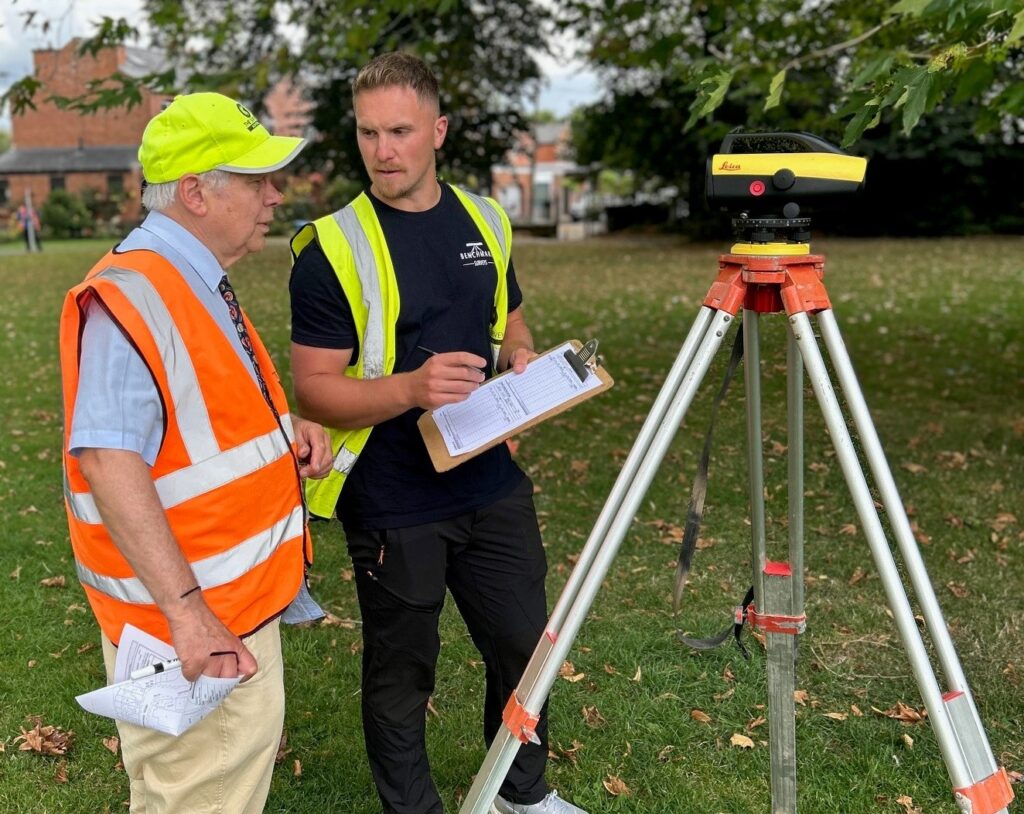
What do you think are the important skills and qualities of a good tutor, how would you describe your approach?
Andrew: Good tutoring prepares Survey School students for handling complex problems out in the field. Tutors support students as they acquire critical thinking skills and an understanding of what they are measuring and what the measurement might be used for. We encourage students to draw diagrams to illustrate the survey problem. Most surveyors, including myself, are better with pictures than with words. So if you can draw a good diagram you can do the maths.
All students work at different rates and come with different skills and experience. We encourage them to work effectively in a team, to learn from and to help their fellow students as well as learning and getting help from us. It is all part of the TSA Course.
Adam: Patience is a key quality for a tutor! All students learn and progress at different rates and it’s important to recognise this in order to be effective. I always try to make a connection between the theory and real-world applications. If the student can see the reason for the maths, they are far more likely to remember it. I’m also a big believer in making students recognise their own mistakes and correct it along the way. Students who learn to take their time will perform much better in real life work situations.
What do you like about tutoring?
Adam: I enjoy seeing the students’ confidence increasing over time, especially those who may have started the course with very little experience.
Andrew: It is encouraging the students, giving them the confidence in maths and seeing them understand the concepts you are explaining. The light bulb moment! I can see when they have put a lot of effort into their work and are really pleased with the results they have achieved. It is interesting to hear of the many projects students are working on and to learn about some of the innovative techniques they employ on site. We can then pass these onto the other students and help improve the level of skill in the industry.
What are some of the most challenging situations you have faced as tutors?
Andrew: Sometimes students do not have the full support of their companies, particularly when it comes to being given the time or equipment needed undertake the course assignments. We encourage students to let us know if they are having problems so we can contact their employer, or arrange to team them up with other members of the class.
Adam: As Andrew says, unfortunately some companies don’t fully realise the importance of giving the student the freedom to attempt an individual assignment, as this is often where they will first apply the skills and methodologies they have learnt whilst in the classroom.
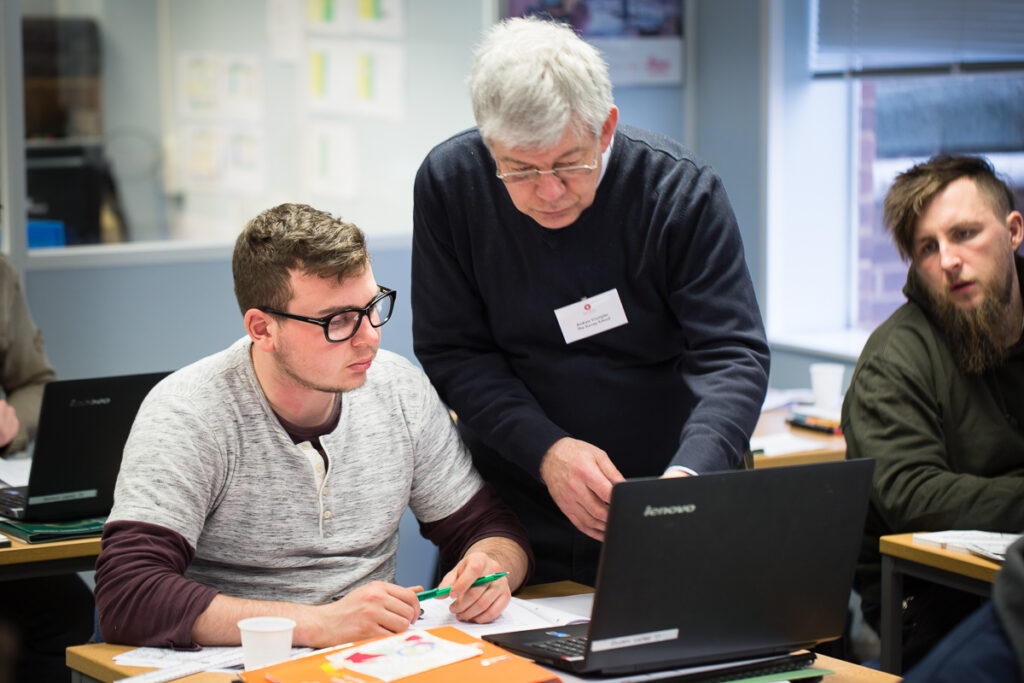
What does the future hold for the development of The Survey School Courses?
Adam: We will continue to add further aspects to the courses, as there are so many rapid advances in data capture techniques, such as mobile laser scanning and photogrammetry, which due to their ‘black box’ automated nature, many trainees are using without understanding how the principles of surveying should still be applied.
Andrew: I think that there is a great future as people are recognising the need to train up more skilled workers, particularly in construction. The Survey School has a wide variety of courses with which surveyors can improve their knowledge and skills, something that all employers can benefit from.
Proudest tutoring moment?
Andrew: The student Awards Day is always a special time, when we get to celebrate students’ graduation from the TSA Surveying Course. It is rewarding to see how proud the students are and to see them recognised for all the hard work they have put in, especially those students who have sponsored themselves.
Adam: Being quite new to the role, it’s still to come! It was great to attend my first student awards day as a tutor last year at the British Motor Museum. Seeing the students enjoying the appreciation of the land surveying community and realising that they are an important part of that community is something I think will always give me a sense of pride that I have played a small part in.
Andrew: We have had some outstanding students over the years. It is always nice to hear how they are progressing in their careers and to know that we have played a small part in encouraging them on their way. After all, the President of the TSA is a past Survey School student!
What do you enjoy doing when you’re not at The Survey School?
Adam: Outside work I enjoy spending time with my family, building a campervan and playing hockey at a steadily decreasing speed!
Andrew: I enjoy spending time with my family, walking on the Malvern Hills, doing a bit of photography or driving my old Land Rover.
To find out more about our tutors and the rest of our team, please visit https://www.surveyschool.org.uk/about-us/
To discovder more about TSA Surveying Course, please go to https://www.surveyschool.org.uk/the-course/
Sygma Solutions Ltd has recently announced the continuation of its successful programme offering free utility mapping training for young people. This initiative is open to any company employing, or having employed within the last 12 months, a young person under the age of 23.
Following a great response in 2024, the offer is limited to one place per company and spaces are soon snapped-up, so early registration is highly recommended!
After the attendee has gained site experience for a minimum of 12 months, Sygma will also provide:
What’s the catch? None! There are no hidden conditions.
Peter Ashcroft, MD at Sygma said,
“As Sygma approaches our 20th anniversary, we recognise more than ever what we owe to this industry and are committed to supporting the next generation and doing whatever we can to support the profession and raise standards”.
Alan Mansell, Survey School Manager commented,
“Utility Mapping is a crucial skill in various industries. Through this programme, Sygma Solutions Ltd not only benefits young people but also helps businesses grow and adapt to our profession’s needs.”
For more details, please contact, neal.sadd@sygma-solutions.com.